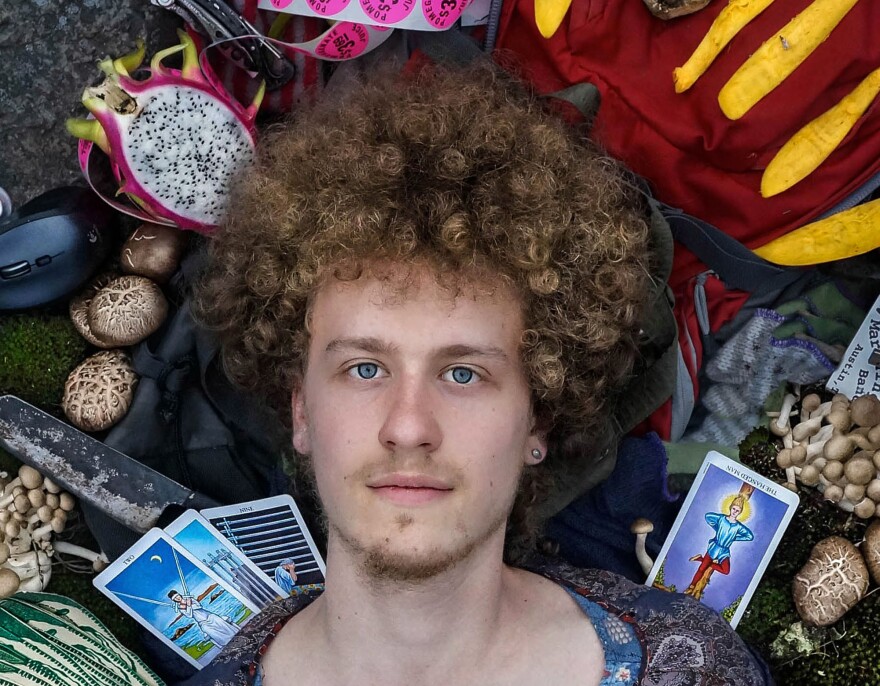When you think of a dumpster diver, you might think of someone like this:
And while you wouldn't be totally wrong, you also wouldn't exactly be describing Maximus Thaler.
A 24-year-old graduate of Tufts University, Thaler is a semiprofessional dumpster diver with a moral purpose. "At some point, I found I could get everything I wanted to eat from a dumpster," he tells The Salt.
Thaler is also the founder of The Gleaners' Kitchen — gleaner being Thaler's euphemism for dumpster diver, derived from the agricultural practice of taking leftover produce and grains from the fields after the harvest. He started the group in Massachusetts to serve dumpster-sourced dinners, but they only managed to host a few meals before the landlord kicked them out.

For a period in his life, while running The Gleaners' Kitchen, Thaler says he was eating 100 percent of his meals from the dumpster.
"Most of the dumpstering I would do was at Trader Joe's," he says, introducing me to a new verb. "They — more than any other grocery store — they plastic-wrap their food a lot," so the chucked goods are still safe to eat. Some grocery stores, like Whole Foods, compact their food right away, mixing plastics and food together, leaving much less treasure for picking, he explains.
A documentary about Thaler and his friends, not yet released, shows them digging in a surprisingly efficient manner — throwing full, multicolored Odwalla bottles into a milk crate and carefully moving half-filled trash bags and papers to pick out vegetables.
"I've never found rats, and I've never gotten sick," he says.
And while he agrees it may take a little training to dive, he suggests the rules regarding finding food that's still good enough to eat are much easier to navigate than those about private property.
"You look at the food, and you smell the food. ... Using your senses is really important," Thaler says.
While vegetables may get mushy and cheeses might mold, it's nothing that Thaler can't cut off or cook up. He says the only thing that's really risky is meat.
"I would never eat a rare steak out of the dumpster," he says. "Don't take the meat that's obvious discolored," he advises. Eggs, on the other hand, are fine, he says, as long as they don't smell absurdly strong of sulfur.
Dumpster divers are protected by a Supreme Court case, California v. Greenwood, in which the court ruled that the Fourth Amendment (the one that bans unreasonable searches and seizures) doesn't protect a person's trash left out for public collection. However, foraging in dumpsters on private property does carry the risk of violating trespassing laws.
At the height of his dumpstering , Thaler and his friends would break out the gloves (also from dumpsters), magnetic LED lights and milk crates (for storage) to quest for food in the middle of the night.
"You want to go really, really quickly," he explains, so you don't get caught.

Cooking for a full house, Thaler could often gather as much as $1,000 worth of food in 20 to 30 minutes. The longer part of the process was sorting the food, cutting away the bad parts of mushy tomatoes or moldy bread, and figuring out what to do with preposterous quantities of one particular item he'd sometimes pick up (he recalls once stumbling upon "thousands of bananas").
For Thaler, the practice is as much philosophical as it is practical. He writes via email:
"There are complex systemic reasons why there is so much food waste in this country, but at their core is the fact that most Americans have forgotten what good food is." He argues that humans have evolved to know what good food is, and we don't need the Food and Drug Administration or sell-by dates to tell us that.
Thaler's friends, he says, are also people who have embraced this "waste not" philosophy: "A lot of my closest friendships have been forged in the dumpster in a lot of ways."
Now living in Berkeley, Calif., Thaler still hasn't been to the grocery store in "a very long time." But he has released a cookbook, A Curious Harvest: The Practical Art of Cooking Everything. The book offers advice for using and storing common ingredients, so nothing goes to waste. For instance, a page on the pineapple notes that when ripe, it will be slightly soft, and it tastes great grilled and served on a burger like tomato slices.
But neither the book nor Thaler's lifestyle is necessarily about legislative activism or publicity — he's just wearing his heart on his tongue.
"I'm trying to build the world that I want to live in," he says, calling it cultural activism. "I start by changing the tiny little world that I live in."
All this week, our friends at Harvest Public Media are examining the issue of food waste in America. Check out their special report.
Copyright 2020 NPR. To see more, visit https://www.npr.org. 9(MDAwMTM1NDgzMDEyMzg2MDcwMzJjODJiYQ004))

